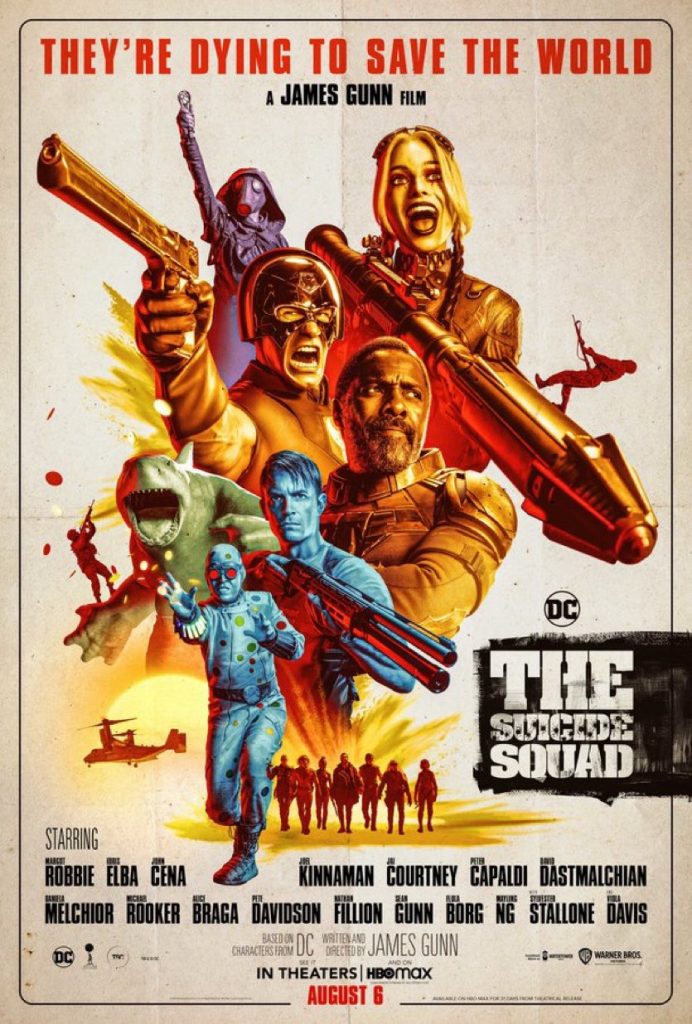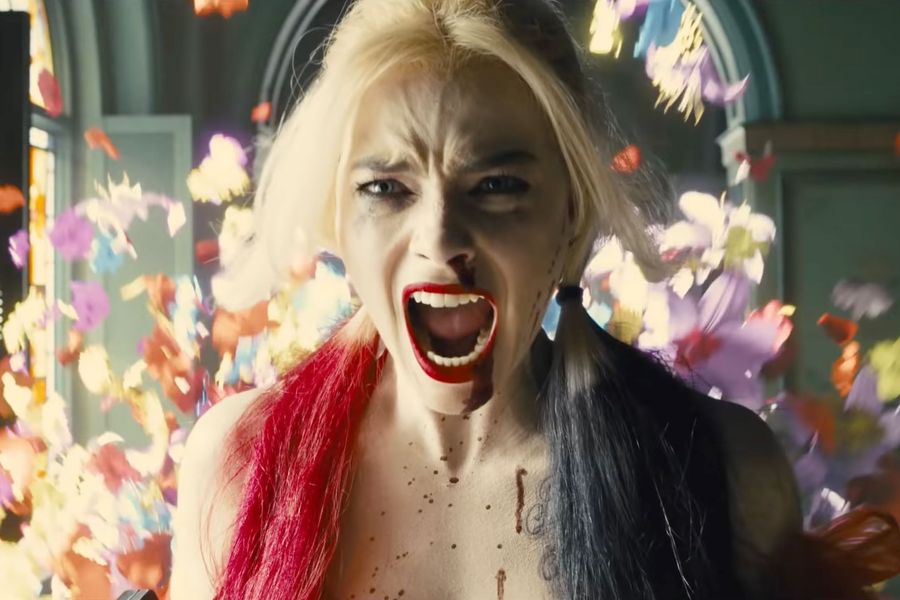The Suicide Squad: Caught Between Heroic and Psychotic
 by Ted Giese
by Ted Giese
In what can be considered a true sequel to David Ayer’s 2006 film Suicide Squad, James Gunn’s 2021 The Suicide Squad clearly benefited from less studio interference. Hamstrung and muddled, Ayer’s film never quite achieved what the director desired to put on the screen, whether for good or for ill. Gunn, on the other hand, has indelibly left his day-glow, irreverent, and off-kilter imprint on the franchise seemingly without any impediment to his quirky sensibilities. Think of the two films as wooden planks dovetailed together by a central theme, shared characters, and a pop aesthetic.
For a new mission, new super-villains are recruited and deployed from prison by Squad director Amanda Waller. They receive promises of freedom, favours, and reduced prison sentences. They are also fitted with exploding ordinances injected into the base of their heads. The idea is that the American government covertly uses dangerous, unhinged criminals with unique “skill sets” in double-super-secret black-ops-style activities both domestically and abroad. The protagonists are all DC comic book villains. The tricky part of watching films like this is remembering they are in fact villains and not heroes because audiences naturally root for the protagonists. Give these characters compelling and emotionally complicated personal lives and the audience is even more endeared to them and forgiving, even when the characters aren’t necessarily looking for forgiveness.
The squad is a rogues gallery. Bloodsport is an elite hitman who agrees to be recruited into Task Force X because it may help his daughter who is in danger of being sent to prison for petit larceny. Polka-Dot Man—who was experimented on as a child by his mother, who wanted to create superheroes through science—agrees to be recruited because he really does desire to be a hero, despite his mother’s acts. The Ratcatcher 2 is an armed robber who controls rats and agrees to the mission because she wants to honour her father who cared for her as a child. Finally, Harley Quinn the former physiatrist and erstwhile moll girlfriend of the Joker seems to go along with the suicide squad because she has nothing better to do.
On a criminal sanity scale, Bloodsport and Ratcatcher 2 are the sanest characters and Polka-Dot Man and Harley Quinn are the most insane. Add in a friendless mutant King Shark—who is a little like a combination of Killer Croc from Ayer’s Suicide Squad, Groot from Gunn’s Guardians of the Galaxy films, and a rescue pit-bull in need of a home—and audiences will have more than enough characters for which to feel sympathy.
The tricky part of watching films like this is remembering they are in fact villains and not heroes because audiences naturally root for the protagonists.
This time around, a military coup in the small fictional island nation of Corto Maltese off the coast of South America prompts the deployment of Task Force X. Because of the anti-American sentiments of the new government, Bloodsport— the freshly-minted leader of the Suicide Squad’s Task Force X— and his team are sent to mop up and hide potentially embarrassing evidence of American involvement in secret unethical experiments. Harley Quinn and Colonel Rick Flag, the survivors of an expendable decoy team also sent by Waller, quickly join the mission. With the help of local guerrilla freedom fighters, the team discovers that the subjects of the experiment were political dissidents and their families. They also learn that the new leaders of Corto Maltese plan to conduct the same experiments on their rivals and enemies.
The object of these experiments, conducted by the Thinker, Gaius Grieves, is a Lovecraftian alien starfish which enslaves the bodies of its victims. Upon discovering that the experiments included children—and that they would continue to do so—the squad sets out to end the experiment and expose the American government’s involvement. They do this against the orders of Waller to their personal peril.
Gunn has made a violent and conflicted film where the pop aesthetic and snappy jokes mask the film’s dark misanthropy. His Guardians of the Galaxy films may have moments of dark humour and harsh violence but they are nothing like The Suicide Squad. This is not a film for children nor is it a film even for many adults. In tone and execution it has much more in common with the Deadpool films or 2011’s The Cabin in the Woods. Graphic violence is often presented as the punchline to a grim joke. The result is a kind of casual disregard and devaluation of life in general. In a world which is becoming more callous every hour, adding humour to brutal violence doesn’t seem like a good idea. That said, the film slowly reveals which characters have a moral compass and which ones are truly broken.
The reluctant leader Bloodsport is paired up with the pathologically patriotic Peacemaker. Their banter and competitive antics eventually break down into hostilities as they find themselves on the opposite side of what is best for America and the people of Corto Maltese. The ultra-violent Peacemaker—whose costume includes a representation of a dove which would be more at home on a felt banner in a church—decides that covering up American involvement in the gruesome experiments is more important than telling the world about the atrocities. Bloodsport meanwhile at the very least wants to end the experiments for good.
Margot Robbie turns in another deft performance as Harley Quinn, and just when audiences are lulled into rooting for her, the film pulls the carpet out from under everyone, reminding us that Harley Quinn for all her charm is really a dangerous psychotic. It is this vacillation between heroic and psychotic that makes the film both compelling and disturbing. Viewers are either seduced into rooting for some ultimately evil characters, which only appear good when contrasted against even worse villains, or they are being confronted with overtly evil acts. Either way the film is an exercise in post-modern moral relativism: the idea that there is no universal or absolute set of moral principles when it comes to good and evil actions, and that such actions can be judged on a sliding scale justified by the circumstances of the individual.
Still, there are some redeemable things for the Christian viewer to contemplate. First, the relationship between Ratcatcher 2 and Bloodsport: the two form a sort of surrogate family relationship, with the former acting as a kind of surrogate daughter and the latter becoming a kind of father figure to the orphaned young woman. She becomes the catalyst for Bloodsport’s paternal instincts, and suggests that Bloodsport may have hope in repairing his relationship with his own estranged daughter.
 A flashback of Ratcatcher 2—real name Cleo Cazo—with her father the original Ratcatcher provides the most important takeaway from the film. She asks her father, “Why rats, Papa?” He in a tender-hearted moment responds: “Rats are the lowliest and most despised of all creatures, my love. But if they have purpose so do we all.” This is reminiscent of Jesus’ words, “Are not two sparrows sold for a penny? And not one of them will fall to the ground apart from your Father. But even the hairs of your head are all numbered. Fear not, therefore; you are of more value than many sparrows” (Matthew 10:29–31).
A flashback of Ratcatcher 2—real name Cleo Cazo—with her father the original Ratcatcher provides the most important takeaway from the film. She asks her father, “Why rats, Papa?” He in a tender-hearted moment responds: “Rats are the lowliest and most despised of all creatures, my love. But if they have purpose so do we all.” This is reminiscent of Jesus’ words, “Are not two sparrows sold for a penny? And not one of them will fall to the ground apart from your Father. But even the hairs of your head are all numbered. Fear not, therefore; you are of more value than many sparrows” (Matthew 10:29–31).
The rats controlled by the orphaned young woman play a pivotal role in the story’s resolution and in a way point to another Biblical idea that God sometimes uses villains to His own end. In Scripture, God sometimes raises up and uses one evil to punish another. Consider, for example, the Chaldeans (see Habakkuk 1:9-11). This is a particularly mysterious and challenging teaching in the Bible, and The Suicide Squad invites contemplation of it.
In a discussion of theft in the Large Catechism, Martin Luther contemplates this spinning wheel of retribution among criminals and villains. “In short if you steal much, you can expect that much will be stolen from you,” he writes. “He who robs and gets by violence and wrong will submit to one who shall act the same way toward him. For God is master of this art. Since everyone robs and steals from another, God punishes one thief by means of another. Or else where would we find enough gallows and rope?” That all said, the question nevertheless remains: is this retribution among criminals a salutary topic of entertainment?
We should also note that redemption in Gunn’s film is largely fixed on personal works-righteousness. When the members of Task Force X (the titular “Suicide Squad”) use their skills for the common good and not for evil, then their characters are redeemed. But Christian viewers should remember that Scripture teaches salvation is a gift of God graciously given through faith—“not a result of works, so that no one may boast” (Ephesians 2:8–9). These cracked and busted characters don’t just need self-repair; they need mercy.
If anything approximating Christian redemption might be found in this film, it must be the grace which they sometimes extend to each other. For example, King Shark says he wouldn’t eat a friend; but then, he has never had friends. When he is first befriended out of necessity, the grace extended to him eventually grows into true friendships. The team likewise grows in compassion toward Polka-Dot Man after hearing the story of how he got his powers—the story of his childhood as an experimental guinea pig. These themes of compassion between team members become the catalyst for them to grow in loyalty towards one another and which inspires them toward heroic acts of self-sacrifice for the good of others.

At its core, this film is a geopolitical espionage story about deep-state funded mind control, vivisection, and blackmail populated with mentally damaged and broken criminals. Layered on top of that is a comedic, cotton candy, comic book veneer, with an underbelly of B-film grind-house horror. For audiences that prefer their entertainment to be less brutally violent and dark, you might be happier rewatching Gunn’s Guardian’s of the Galaxy films. But the brutality is a return to form for a director who began his career with 2006’s film Slither and work for schlock horror production company Troma Entertainment. At any rate, this R-rated film by Gunn—while well crafted, acted, and directed—is not for everyone.
———————
Rev. Ted Giese is lead pastor of Mount Olive Lutheran Church, Regina, Saskatchewan, Canada; a contributor to The Canadian Lutheran, Reporter; and movie reviewer for the “Issues, Etc.” radio program. For more of his television and movie reviews, check out the Lutheran Movie Review Index.




